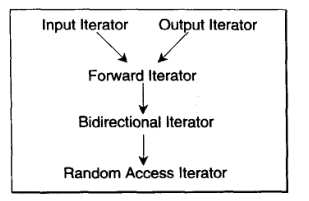迭代器是一种抽象的设计概念。iterator模式:提供一种方法,使能够依序寻访某个聚合物所含的各个元素,而又无需暴露该聚合物的内部表述方式。
迭代器的设计思维-stl关键所在
STL的中心思想在于:将数据容器和算法分开,彼此独立设计。容器和算法的泛型化。
迭代器就是扮演着粘胶角色。
迭代器是一种smart pointer
list迭代器stl的实现
1
2
3
4
5
6
7
8
9
10
11
12
13
14
15
16
17
18
19
20
21
22
23
24
25
26
27
28
29
30
31
32
33
34
35
36
37
38
39
40
41
42
43
44
45
46
47
48
49
50
51
52
53
54
55
56
57
58
59
60
61
62
63
64
65
66
67
68
69
70
71
72
73
74
75
|
//listnode的基础类
struct _List_node_base {
_List_node_base* _M_next;
_List_node_base* _M_prev;
};
//listnode
template <class _Tp>
struct _List_node : public _List_node_base {
_Tp _M_data;
};
//迭代器基础类
struct _List_iterator_base {
typedef size_t size_type;
typedef ptrdiff_t difference_type;
typedef bidirectional_iterator_tag iterator_category;
_List_node_base* _M_node;//包含一个node
_List_iterator_base(_List_node_base* __x) : _M_node(__x) {}
_List_iterator_base() {}
void _M_incr() { _M_node = _M_node->_M_next; }
void _M_decr() { _M_node = _M_node->_M_prev; }
bool operator==(const _List_iterator_base& __x) const {
return _M_node == __x._M_node;
}
bool operator!=(const _List_iterator_base& __x) const {
return _M_node != __x._M_node;
}
};
//迭代器
template<class _Tp, class _Ref, class _Ptr>
struct _List_iterator : public _List_iterator_base {
typedef _List_iterator<_Tp,_Tp&,_Tp*> iterator;
typedef _List_iterator<_Tp,const _Tp&,const _Tp*> const_iterator;
typedef _List_iterator<_Tp,_Ref,_Ptr> _Self;
typedef _Tp value_type;
typedef _Ptr pointer;
typedef _Ref reference;
typedef _List_node<_Tp> _Node;
_List_iterator(_Node* __x) : _List_iterator_base(__x) {}
_List_iterator() {}
_List_iterator(const iterator& __x) : _List_iterator_base(__x._M_node) {}
reference operator*() const { return ((_Node*) _M_node)->_M_data; }
#ifndef __SGI_STL_NO_ARROW_OPERATOR
pointer operator->() const { return &(operator*()); }
#endif /* __SGI_STL_NO_ARROW_OPERATOR */
//重载了几个操作实现了迭代器,不是很复杂
//++i
_Self& operator++() {
this->_M_incr();
return *this;
}
//i++
_Self operator++(int) {
_Self __tmp = *this;
this->_M_incr();
return __tmp;
}
_Self& operator--() {
this->_M_decr();
return *this;
}
_Self operator--(int) {
_Self __tmp = *this;
this->_M_decr();
return __tmp;
}
};
|
Traits编程技法
之前就见到用过,通过类型获取,其余的类型。
1
2
3
4
5
6
7
8
9
10
11
12
13
14
15
16
17
18
19
20
21
22
23
24
25
26
27
28
29
30
31
32
33
34
35
36
37
|
template <class _Category, class _Tp, class _Distance = ptrdiff_t,
class _Pointer = _Tp*, class _Reference = _Tp&>
struct iterator {
typedef _Category iterator_category;
typedef _Tp value_type;
typedef _Distance difference_type;
typedef _Pointer pointer;
typedef _Reference reference;
};
template <class _Iterator>
struct iterator_traits {
typedef typename _Iterator::iterator_category iterator_category;
typedef typename _Iterator::value_type value_type;
typedef typename _Iterator::difference_type difference_type;
typedef typename _Iterator::pointer pointer;
typedef typename _Iterator::reference reference;
};
//对原生指针特化
template <class _Tp>
struct iterator_traits<_Tp*> {
typedef random_access_iterator_tag iterator_category;
typedef _Tp value_type;
//ptrdiff_t是C/C++标准库中定义的一个与机器相关的数据类型。ptrdiff_t类型变量通常用来保存两个指针减法操作的结果。ptrdiff_t定义在stddef.h(cstddef)这个文件内。ptrdiff_t通常被定义为long int类型。
typedef ptrdiff_t difference_type;
typedef _Tp* pointer;
typedef _Tp& reference;
};
template <class _Tp>
struct iterator_traits<const _Tp*> {
typedef random_access_iterator_tag iterator_category;
typedef _Tp value_type;
typedef ptrdiff_t difference_type;
typedef const _Tp* pointer;
typedef const _Tp& reference;
};
|
迭代器的分类:
input iter:只读iter
output iter:只写iter
forward iter:允许写入型算法在这种迭代器所形成的区间操作,前向迭代器
bidirectional iterator:双向移动iter。
random access iter:前三种支持++,第四种支持++ –。这种支持所有指针的算术能力。

typedef typename _Iterator::iterator_category iterator_category;的作用就是能够在编译器发现迭代器的类型,选用最合适的函数版本。
```cpp
struct input_iterator_tag {};
struct output_iterator_tag {};
struct forward_iterator_tag : public input_iterator_tag {};
struct bidirectional_iterator_tag : public forward_iterator_tag {};
struct random_access_iterator_tag : public bidirectional_iterator_tag {};
```
例子
```cpp
template
inline void __advance(_InputIter& __i, _Distance __n, input_iterator_tag) {
while (__n--) ++__i;
}
template <class _BidirectionalIterator, class _Distance>
inline void __advance(_BidirectionalIterator& __i, _Distance __n,
bidirectional_iterator_tag) {
__STL_REQUIRES(_BidirectionalIterator, _BidirectionalIterator);
if (__n >= 0)
while (__n–) ++__i;
else
while (__n++) –__i;
}
template <class _RandomAccessIterator, class _Distance>
inline void __advance(_RandomAccessIterator& __i, _Distance __n,
random_access_iterator_tag) {
__STL_REQUIRES(_RandomAccessIterator, _RandomAccessIterator);
__i += __n;
}
template <class _InputIterator, class _Distance>
inline void advance(_InputIterator& __i, _Distance __n) {
__STL_REQUIRES(_InputIterator, _InputIterator);
//通过下面的函数,选用合适的版本
//不需要传递参数,能够在编译器选定版本
__advance(__i, __n, iterator_category(__i));
}
1
2
3
4
5
6
7
8
9
10
11
12
13
14
15
16
17
18
19
20
21
22
23
24
25
26
27
28
29
30
31
32
33
34
35
36
37
38
|
# __type_traits
提供一种机制,允许针对不同的型别熟悉,完成函数派送。
在内存配置器中就用到了,比如有没有拷贝构造函数等
```cpp
struct __true_type {
};
struct __false_type {
};
//选择使用__false_type为struct的目的是为了类型推倒,而不是使用bool值作为参数的话只是运行时的选择。
template <class _Tp>
struct __type_traits {
typedef __true_type this_dummy_member_must_be_first;
/* Do not remove this member. It informs a compiler which
automatically specializes __type_traits that this
__type_traits template is special. It just makes sure that
things work if an implementation is using a template
called __type_traits for something unrelated. */
/* The following restrictions should be observed for the sake of
compilers which automatically produce type specific specializations
of this class:
- You may reorder the members below if you wish
- You may remove any of the members below if you wish
- You must not rename members without making the corresponding
name change in the compiler
- Members you add will be treated like regular members unless
you add the appropriate support in the compiler. */
typedef __false_type has_trivial_default_constructor;
typedef __false_type has_trivial_copy_constructor;
typedef __false_type has_trivial_assignment_operator;
typedef __false_type has_trivial_destructor;
typedef __false_type is_POD_type;
};
|
然后在这个文件里定义了大量的特化,主要是特化C++标准类型。
1
2
3
4
5
6
7
8
|
__STL_TEMPLATE_NULL struct __type_traits<bool> {
typedef __true_type has_trivial_default_constructor;
typedef __true_type has_trivial_copy_constructor;
typedef __true_type has_trivial_assignment_operator;
typedef __true_type has_trivial_destructor;
typedef __true_type is_POD_type;
};
//等。。。
|
 typedef typename _Iterator::iterator_category iterator_category;的作用就是能够在编译器发现迭代器的类型,选用最合适的函数版本。
```cpp
struct input_iterator_tag {};
struct output_iterator_tag {};
struct forward_iterator_tag : public input_iterator_tag {};
struct bidirectional_iterator_tag : public forward_iterator_tag {};
struct random_access_iterator_tag : public bidirectional_iterator_tag {};
```
例子
```cpp
template
typedef typename _Iterator::iterator_category iterator_category;的作用就是能够在编译器发现迭代器的类型,选用最合适的函数版本。
```cpp
struct input_iterator_tag {};
struct output_iterator_tag {};
struct forward_iterator_tag : public input_iterator_tag {};
struct bidirectional_iterator_tag : public forward_iterator_tag {};
struct random_access_iterator_tag : public bidirectional_iterator_tag {};
```
例子
```cpp
template